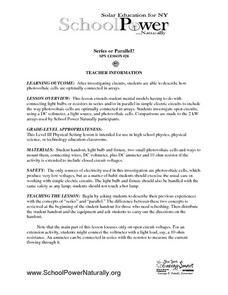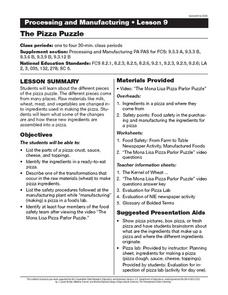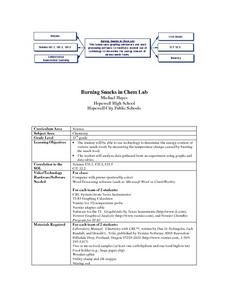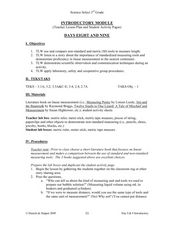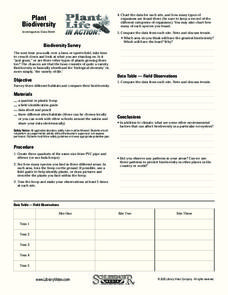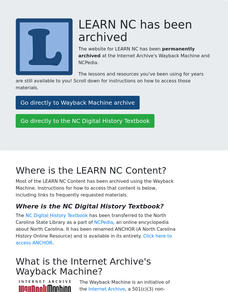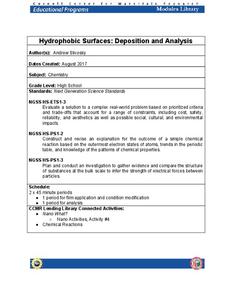Curated OER
Dependence of Light Intensity on Distance
Hopefully you have a sensor interface for your physics class to use with graphing calculators when collecting data with a light sensor. If so, read on. Use this resource for learners to predict and then test whether or not the intensity...
Curated OER
Competition/Cooperation Relationships
Students view the PowerPoint slide of a lynx and hare and discuss what would happen if all the lynxes were destroyed. They then take notes on the lesson and brainstorm about other competitive/cooperative relationships as well as discuss...
Curated OER
Testing Leaves for Starch: the Technique
Like good scientists, kids often want to see first-hand why things are as they are; they can do just that in the starch-testing photosynthesis activity found here. Depending on the age of your pupils, you may wish to do the investigation...
Curated OER
The Coriolis Effect
Students will determine the direction of Earth's rotation as viewed from the north and south if they were suspended out in space. They will model how the rotation of the Earth causes currents to be deflected in different directions for...
Curated OER
Series or Parallel?
Physics classes that are studying electricity connect photovoltaic cells into both series and parallel circuits. Inquiry and critical thinking come into play as learners try to determine which circuit is more productive. They associate...
Curated OER
Using Photovoltaic Cells and Systems
This interesting document suggests nine different activities for shedding light on photovoltaic cells. A bit of background information is furnished for you, as well as many, many resource links. Listed for each activity are a learning...
Curated OER
Investigating Mitosis in Allium Root Tip Squash
Preparing the root tip samples is the most challenging part of the mitosis-viewing lab found here, but the directions help ensure you have everything you need. There is no worksheet included; however, there is a sample data table....
Curated OER
Who Done It?
Pick and choose which activities to include in this crime scene investigation. Junior detectives can examine fingerprints, DNA, blood samples, or bone structure. The plan suggests you have teams solve a mystery, but it does not give you...
Nuffield Foundation
Dissecting Lungs
Here is a lab activity where teens experience the respiratory system first-hand as they dissect lungs and identify key structures within the system. Although the website is written in British English with some slightly different verbiage...
Nuffield Foundation
A Closer Look at Blood
Here is a lab that has teenage scientists examining samples of their own blood under a microscope. Learners carefully prepare slides, then make detailed observations and identifying different types of cells using a key.
Curated OER
The Pizza Puzzle
Students identify the origin and preparation of the main ingredients in pizza. They identify the food safety procedures followed in a pizza factory and then prepare and eat a pizza in class.
Curated OER
Burning Snacks in Chem Lab
Students determine the energy content of various snack foods. They measure the temperature changes in various snack foods as the foods are burned in order to determine the foods' energy content. Students create graphs and data tables of...
Curated OER
Exercise and Heartrate
Fourth graders experiment to find the effects of exercise on the heart rate. In this exercise and heart rate lesson, 4th graders create questions about exercise and heart rate. Students use the scientific method to test and analyze...
Curated OER
Introduction to Scientific Method
Students investigate safe laboratory procedures, classroom management guidelines, and group roles and procedures. They study a set of safety guidelines with their parents, and to sign a contract stating that they understand the...
Curated OER
Introductory Module
Third graders examine the non-standard method of measurement and compare it to the metric system of measurement. In this introductory module lesson, 3rd graders discover the scientific observation. Students also develop communication...
Curated OER
Plant Life in Action
Sixth graders examine various habitats and record the living creatures they found. In this biodiversity lesson, 6th graders complete a worksheet recording their observations. Students draw conclusions about the climate and its effect on...
Curated OER
Sheep Heart Dissection
Fifth graders examine a sheep heart. In this biology lesson, 5th graders dissect a sheep heart to identify the parts of a heart including the aorta, valve, septum, and ventricle.
Curated OER
Introduction to Gases
Students are introduced to gases. In this science lesson plan, students demonstrate that gases are a state of matter, generate a number of gases, discover some properties of gases, compare some of the properties of different gases, and...
Curated OER
Types of Chemical Reactions
Students conduct labs to gain an overview of chemical reactions. They observe examples of synthesis, decomposition, single displacement and double displacement reactions. They identify certain products by the use of litmus and splint tests.
Kenan Fellows
The Newton Challenge
Make Newton proud. Scholars apply their understanding of forces and energy to an engineering design challenge. They learn about simple machines, create a presentation on Newton's laws, and develop a balloon-powered car.
Curated OER
Allocating Energy from a Photovoltaic System
How much electricity do you use in a day? Physics fanatics calculate their energy use by consulting a chart of the watts required to run typical household appliances. They compare power to amounts of electric energy used or generated....
Cornell University
Hydrophobic Surfaces—Deposition and Analysis
Couches, carpets, and even computer keyboards now advertise they are spill-resistant, but what does that mean? Scholars use physical and chemical methods to coat surfaces with thin films to test their hydrophobic properties. Then they...
Curated OER
Teen Driving: Skills, Responsibilities and Reactions
As an introduction to the skills required for and responsibilities of driving, pre-teens and teens engage in a series of activities, chart their response times, and analyze how variables effect these reaction times. Class groups use the...
American Chemical Society
Why Does Water Dissolve Sugar?
Did you know that if you wait long enough, the M on the outside of an M and M will float to the surface when submerged in water? Learners observe the sugar coating of an M and M while it is dissolving in water. They explain how this...






